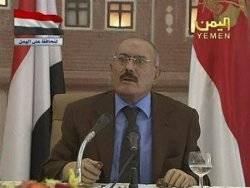Yemeni President Ali Abdullah Saleh has said that he will meet anti-government protesters' demands and leave power in the coming days, but opposition leaders remain skeptical.
"I reject power and I will continue to reject it, and I will be leaving power in the coming days," the veteran leader said on Saturday in a televised speech during which he launched a tirade against his opponents.
Saleh said it was "impossible to let them destroy the country," whereas there were "sincere men, whether they be military or civilian" who were capable of governing Yemen.
Many of Saleh's opponents believe that if he does agree to step down, it will be to transfer power to a family member - a charge he vehemently denied.
"How many are the president's sons? How big is the president's family? How many brothers or grandchildren? How many of those are in power?" Saleh said.
Saleh's son Ahmed and several of his nephews control powerful military units, and Ahmed has long been seen as the heir apparent to the presidency.
Saleh said he would meet with parliament in the coming days to "transparently discuss" the situation in Yemen, but stopped short of making a firm commitment to quit.
Anti-government protesters have been camped in a central square dubbed 'Change Square' in the capital Sanaa for nearly nine months, demanding that Saleh step down after 33 years in power.
Skepticism
Tawakul Karman a prominent Yemeni activist who was awarded the Nobel Peace Prize on Friday, told Al Jazeera that protesters were skeptical of Saleh's announcement - as he had promised to step down in the past, but had not.
"He has to hand over the power; he has to give the power that he has stolen to the revolution people, the revolution rule. We don't believe him," she said.
"We are continuing our peaceful revolution," she added.
Ibrahim Mohamed al-Saidi, Yemeni youth opposition leader, told Al Jazeera that Saleh has no intention of stepping down.
"It's the same old broken tune with the song that's I will leave, I will leave, but I will never leave," he said.
Saidi also said that Saleh was "playing too many games" and only made Saturday's statement to shore up support in the public and within his party.
Saleh was "trying to make the people think that he is good and that he will leave, and then he will get more publicity around and generate more people to be surrounded by.
"He's trying to get some of the leaders from the same party, which is his party, to come back to his party again because they left him and they resigned from work with him."
Mohammed al-Sabri, an opposition spokesman, said Saleh's words were intended to generate headlines ahead of a UN Security Council meeting on Tuesday that is to discuss the failed efforts to convince Saleh to sign the power transfer deal.
"If the president was serious and is convinced that the public no longer wants him, he should do it today and not tomorrow," Sabri said.
Gulf Initiative
Abdo Al Janadi, Yemen's deputy minister of information, told Al Jazeera that what Saleh meant by saying that he was stepping down is that he had accepted the Gulf Co-operation Council (GCC) Initiative - a plan under which he would hand over power in return for a promise of immunity from prosecution.
"The president has accepted the GCC initiative; which states for his resignation and early elections," he said. "Saleh’s statement means he will remain in office until the mechanism for the implementation of the initiative is agreed on."
According to Janadi, "The word 'few days' means days or weeks until the negotiating parties reach an agreement."
"We will not see the same as what happened in Egypt or Libya," he added.
Saleh had been involved in the GCC negotiations for months, repeatedly promising to step down only to change his position at the last minute.
PHOTO CAPTION
Yemen's President Ali Abdullah Saleh delivers his speech on state television in this still image taken from video October 8, 2011.
Al Jazeera


 Home
Home Discover Islam
Discover Islam Quran Recitations
Quran Recitations Lectures
Lectures
 Fatwa
Fatwa Articles
Articles Fiqh
Fiqh E-Books
E-Books Boys & Girls
Boys & Girls  Articles
Articles










